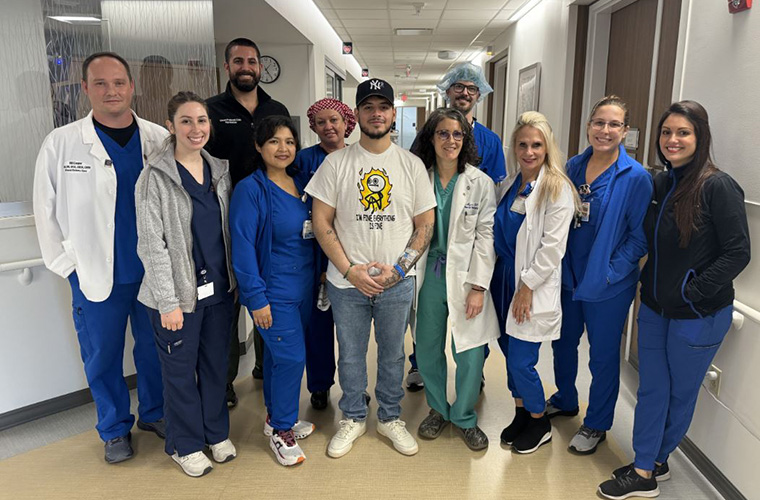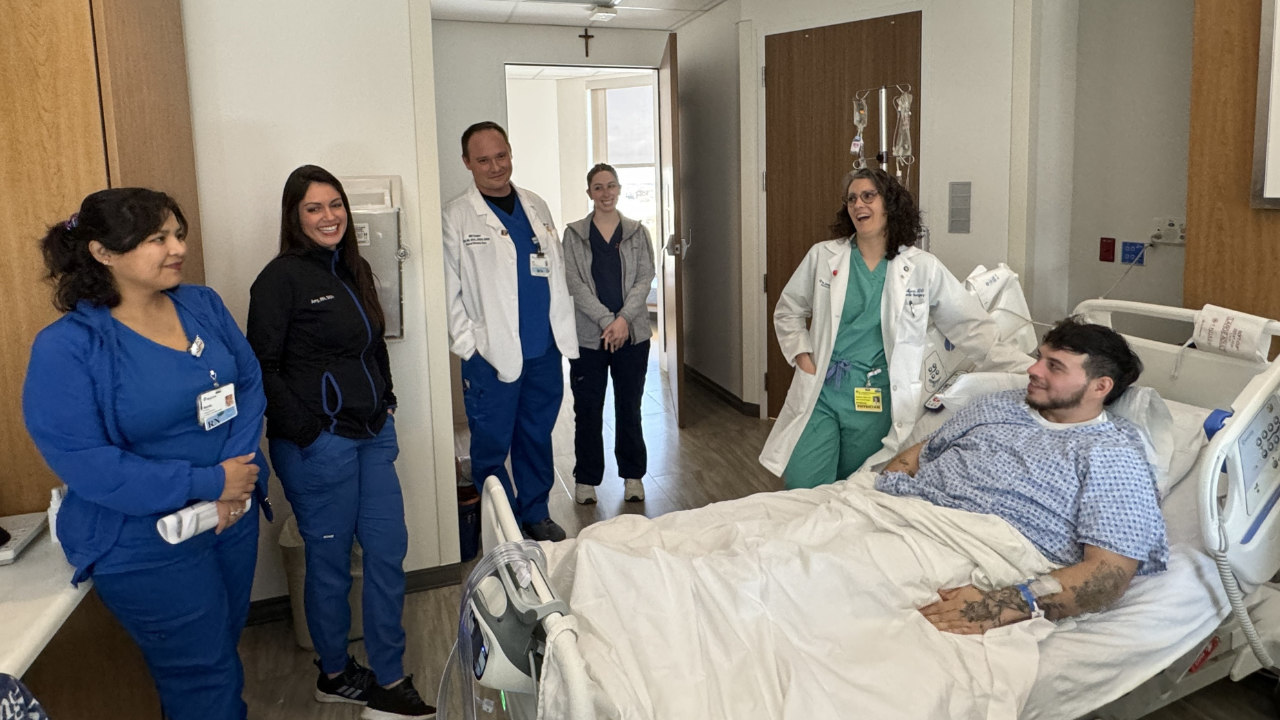Young Colorectal Cancer Patient: 'I Never Thought It Could Happen to Me'
As a home improvement contractor, Alex Mojica always felt that he was healthy. A native of Boston, he arrived in Florida in January 2023 to find work after Hurricane Ian caused major damage in Southwest Florida.
One day while on a job site, he was in so much pain he couldn’t get out of his truck. “I sat there for an hour until the pain went away,” said Mojica, 35. “But I knew I had to finish the job. Once it was over, I went back to work.”
Mojica knows now that he should have gone straight to the emergency room. When he did get to BayCare’s St. Joseph’s Hospital South ER, he learned that he had a tumor that was cancerous.
“I’m young,” Mojica said recently from his St. Joseph’s Hospital room. “How could I have this? It’s only something that older people get. I was shocked.”
Mojica isn’t alone. Physicians are seeing younger patients facing this disease. The American Cancer Society (ACS) at Cancer.org estimates that since the mid-1990s, the incidence of patients ages 55 and younger suffering from this has risen 1% to 2% each year. Meanwhile, the numbers for Americans 55 and older are decreasing.
“I have personally cared for quite a few patients between the ages of 35-45 with colorectal cancer,” said Elizabeth Myers, DO, a BayCare Medical Group colorectal surgeon with the St. Joseph’s Hospitals Cancer Institute. “I have even taken care of a 29-year-old with colon cancer. Many of these patients are healthy individuals as well who had seemingly benign symptoms that they dismissed in the course of their busy young lives.”
Around 2018, the ACS started recommending that average risk screening for colorectal cancer should begin at age 45, Dr. Myers said. “If there is a family history, we typically recommend starting screening at the age of 40 or 10 years earlier than the age of diagnosis of the affected individual,” she added.
However, most of these younger patients have sporadic cancers which means they have no family history, Dr. Myers said.
Mojica fits that description. He knows of no one in his family who had colon cancer. But there were signs. “I was on a job one day and went to use the bathroom and nothing came out, just blood,” he said. “I would have severe pain in my lower back. I would be dizzy and have hot flashes.”
"I think we have to be mindful of our bodies,” Dr. Myers said. “If we're having persistent bleeding, change in our bowel habits or abdominal or pelvic pain, things that aren't just happening for a day but are a progressive thing, you need to seek evaluation for that."
It was severe stomach pain – “the worst pain of my life,” Mojica said – that sent him to the St. Joseph’s South ER. After a scan, they found a tumor and told him that he would have to stay overnight.
When the doctors saw him the next day, they told me that it could be cancer and they wanted to do a colonoscopy and a biopsy. As suspected, Mojica was diagnosed with a locally advanced rectal adenocarcinoma, Dr. Myers said.
“I was so sad,” he said. “The tumor was really big. I am so young. You only hear about this with older people. I never thought it could happen to me.”
Mojica began receiving cancer treatment at St. Jospeh’s Hospitals Cancer Institute. Before surgery, his team of doctors, which included Dr. Myers, Luiz Marconcini, MD, and Nitesh Paryani, MD, wanted to shrink the tumor. “He required five weeks of chemoradiation followed by another four months of chemotherapy,” Dr. Myers said.
The treatment left him with little energy. “My friends and family were used to seeing me strong and healthy,” Mojica said. “I don’t think they really understood what I was going through.”
During this time, Mojica was coping with the loss of his mother from cardiac issues and his sister, Maria Mojica, who was suffering with her own cancer diagnosis. “My oldest sister was diagnosed with esophageal cancer six months before I received my cancer diagnosis,” Mojica said. “She was the only one who understood. We would always tell each other to stay strong.”
Maria Mojica passed away in early February in Boston. She was 43. Her funeral was a day before his surgery and he was able to stream it from his hospital room. “I felt like I was going through this alone,” Alex Mojica said.

His physicians and the St. Joseph’s surgical unit team stepped in to give Mojica the support he needed throughout his treatment, surgery and recovery.
“The cancer center did an amazing job supporting Alex. I have gotten to spend a lot of time with him during his recovery and he opened up to me about how challenging his diagnosis has been … while trying to cope with the loss of two important people in his life,” Dr. Myers said. “My heart goes out to him, and I am inspired by his courage in the face of this challenging diagnosis and the loneliness he has had to endure with this. I am grateful to our wonderful nursing staff on 7T who treated him like their own family. Sometimes, the collective uplift of people is just as important for the human spirit as the medical treatment.”
Mojica agrees. “The staff and doctors kept me up,” he said. “They gave me hope. Everyone was so nice and supportive. Dr. Myers is my savior. She makes me feel so safe.”
“He has opened up to us with his personal life and he cried on my shoulder during a walk on the unit about his whole experience. He stated my staff were his family now and how grateful he is for Dr. Myers and my staff,” said Story Southworth, surgical unit nurse manager. “He really touched our hearts as a young man going through all of this basically alone. I am very proud of my staff for embracing him.
Dr. Myers said that Mojica asked what he could do to let people know about the rise in colorectal cancer in younger people. “I suggested we share his story to help raise awareness,” she said. “He went through a lot with treatment at such a young age – a time when most people are in the prime of their young lives. He is doing well and recovering physically, mentally and spiritually and we are privileged to have been part of his deeply personal journey. “
Mojica is grateful that his cancer was removed, and he can transition to survivorship and move forward with his life. “I want to tell younger people that when something doesn’t feel right, they should go to the doctor and get examined,” he said. “I want to help people my age to understand this.”
And he wants to continue to stay strong for his sister’s memory. “My sister couldn’t beat (cancer) but I beat it,” he said. “She’ll continue to live through me.”
BayCare offers information on colorectal cancer symptoms, screening, treatment and recovery. Learn more: BayCare.org Colon and Rectum Cancer page.

